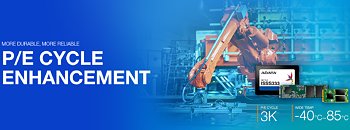Wednesday, June 12th 2019

ADATA Upgrades Endurance Rating of Its Industrial-Grade 3D TLC SSDs
ADATA Technology (Taiwan Stock Exchange: 3260.TWO), a leading manufacturer of high-performance DRAM modules, NAND Flash products, and mobile accessories announces that it has upgraded the endurance rating of its industrial-grade 3D TLC solid state drives (SSD) to 3K P/E cycles, bringing their endurance, reliability, and stability up to par with 2D MLC SSDs. Combined with their ability to operate in a wide range of temperatures (-40° C to 85° C), they are excellent solutions that provide the durability and consistency required by applications such as Artificial Intelligence, Internet of Things (IoT), Intelligent Transportation Systems, surveillance systems, data centers, network operations, defense systems, and energy exploration.
The continual improvements in NAND Flash design and manufacturing, as well as the ever-changing demands of the market, have driven 3D NAND to become a popular memory solution across many industries. Despite its growing prominence, 3D NAND has had two major deficiencies, namely the ability to operate in extreme temperatures and achieve higher endurance ratings. To fill this gap, ADATA has upgraded its industrial-grade 3D TLC SSDs to an endurance rating of 3K P/E cycles, which makes them comparable to 2D MLC SSDs. At the same, ADATA 3D TLC SSDs are also designed to operate in a wide temperature range (-40° C to 85° C), delivering a memory solution that is long-lasting, robust, and reliable.Beyond endurance and wide-temperature operations, ADATA industrial-grade 3D TLC SSDs also come with up to 1TB of capacity and in 2.5", M.2 2280, M.2 2242, and mSATA specifications, to meet the diverse needs of various applications, customers, and industries. What's more, for added reliability and improved cost efficiency, ADATA industrial-grade 3D TLC SSDs implement the company's proprietary A+ SLC technology. It utilizes custom NAND Flash firmware with an A+ sorting algorithm to emulate SLC performance. A+ SLC is highly reliable, provides excellent data integrity, and delivers a superb cost/performance balance.
Currently, the following ADATA industrial-grade 3D TLC SSDs comes with an endurance rating of 3K P/E cycles: ISSS333 and ISSS316 2.5" SSDs, IM2S3338 and IM2S3168 M.2 2280 SSDs, IM2S3334 and IM2S3164 M.2 2242 SSDs, and IMSS316 mSATA SSD.
The continual improvements in NAND Flash design and manufacturing, as well as the ever-changing demands of the market, have driven 3D NAND to become a popular memory solution across many industries. Despite its growing prominence, 3D NAND has had two major deficiencies, namely the ability to operate in extreme temperatures and achieve higher endurance ratings. To fill this gap, ADATA has upgraded its industrial-grade 3D TLC SSDs to an endurance rating of 3K P/E cycles, which makes them comparable to 2D MLC SSDs. At the same, ADATA 3D TLC SSDs are also designed to operate in a wide temperature range (-40° C to 85° C), delivering a memory solution that is long-lasting, robust, and reliable.Beyond endurance and wide-temperature operations, ADATA industrial-grade 3D TLC SSDs also come with up to 1TB of capacity and in 2.5", M.2 2280, M.2 2242, and mSATA specifications, to meet the diverse needs of various applications, customers, and industries. What's more, for added reliability and improved cost efficiency, ADATA industrial-grade 3D TLC SSDs implement the company's proprietary A+ SLC technology. It utilizes custom NAND Flash firmware with an A+ sorting algorithm to emulate SLC performance. A+ SLC is highly reliable, provides excellent data integrity, and delivers a superb cost/performance balance.
Currently, the following ADATA industrial-grade 3D TLC SSDs comes with an endurance rating of 3K P/E cycles: ISSS333 and ISSS316 2.5" SSDs, IM2S3338 and IM2S3168 M.2 2280 SSDs, IM2S3334 and IM2S3164 M.2 2242 SSDs, and IMSS316 mSATA SSD.

8 Comments on ADATA Upgrades Endurance Rating of Its Industrial-Grade 3D TLC SSDs
ADATA does come up with very competitively priced drives, though.